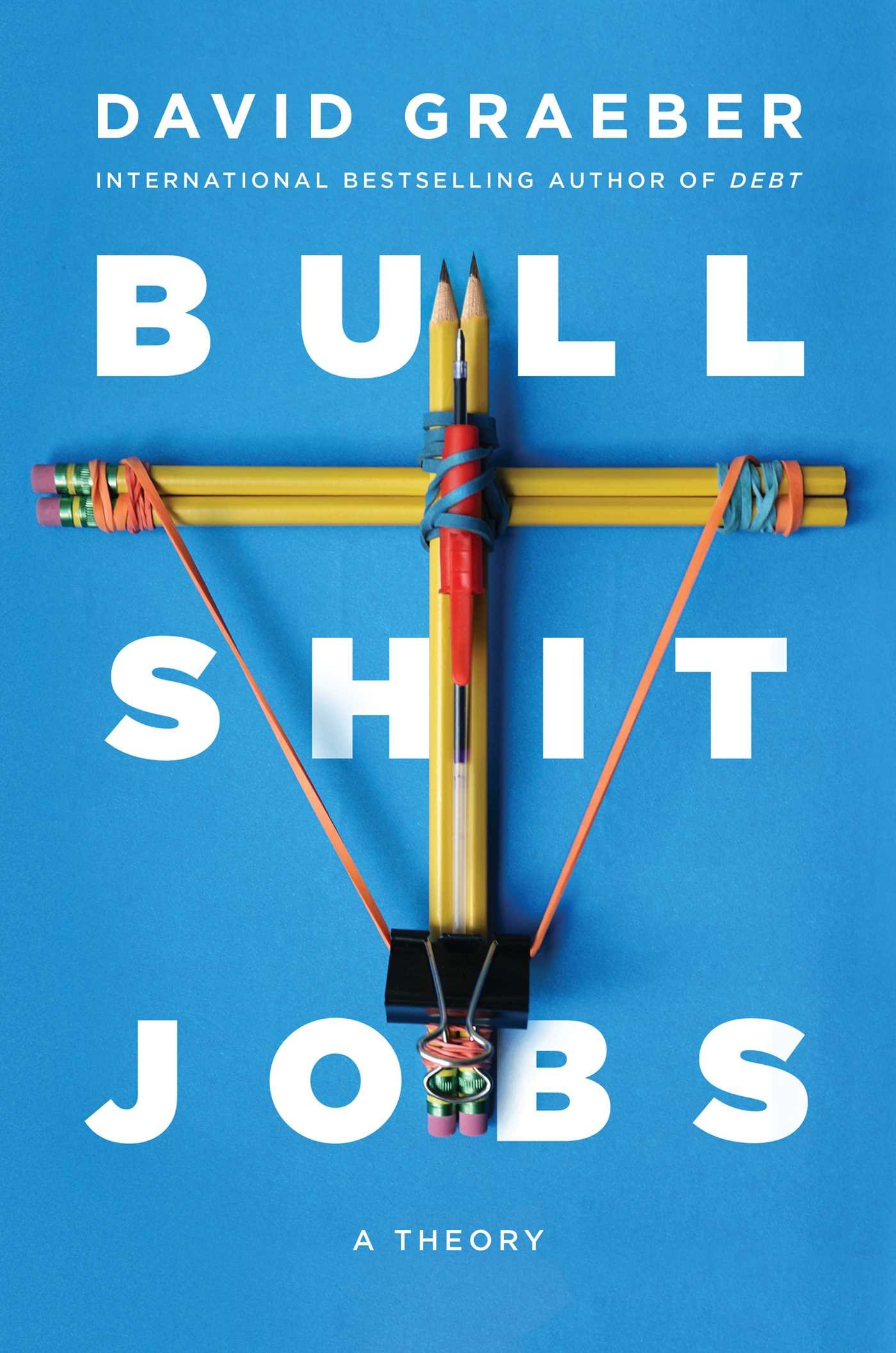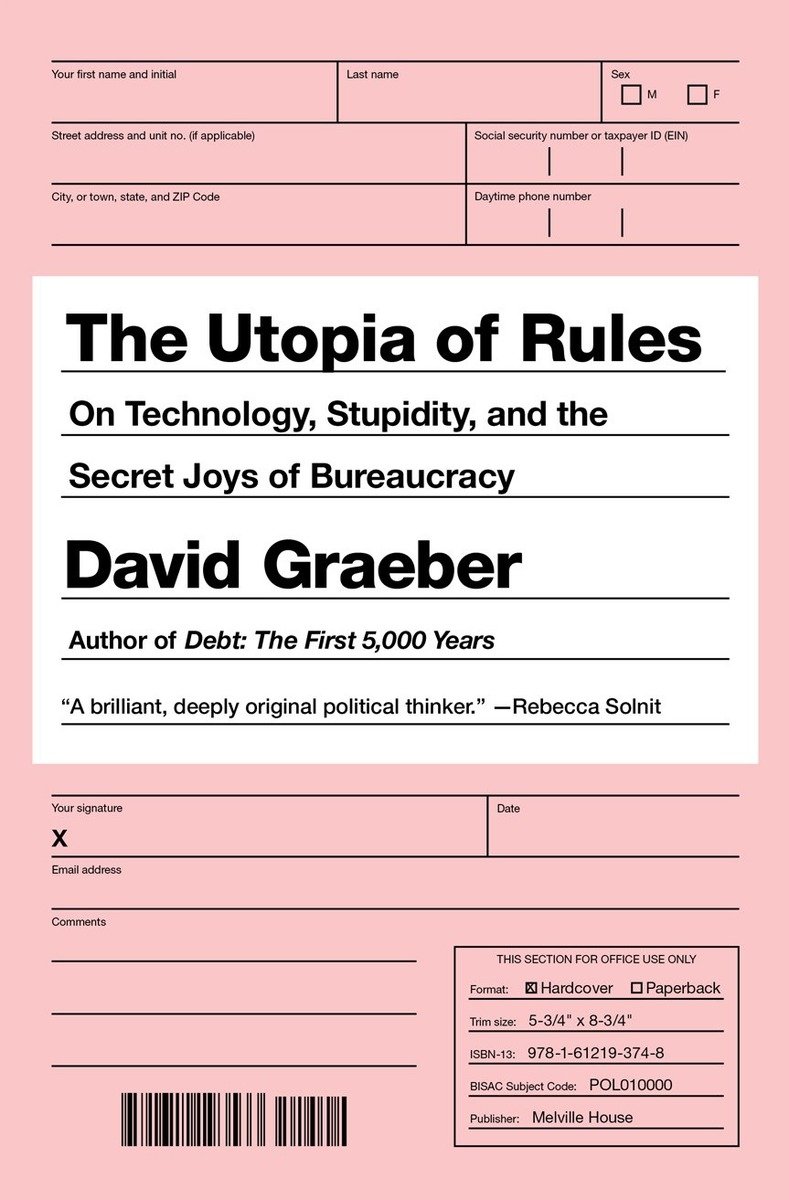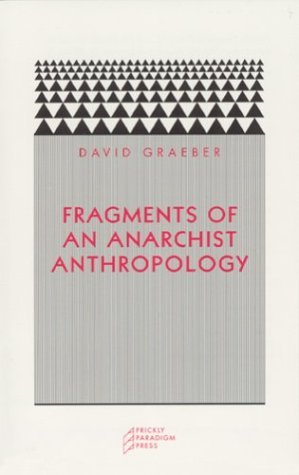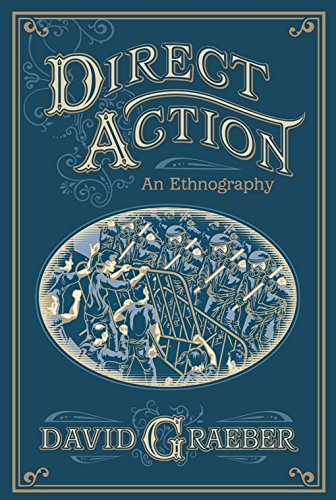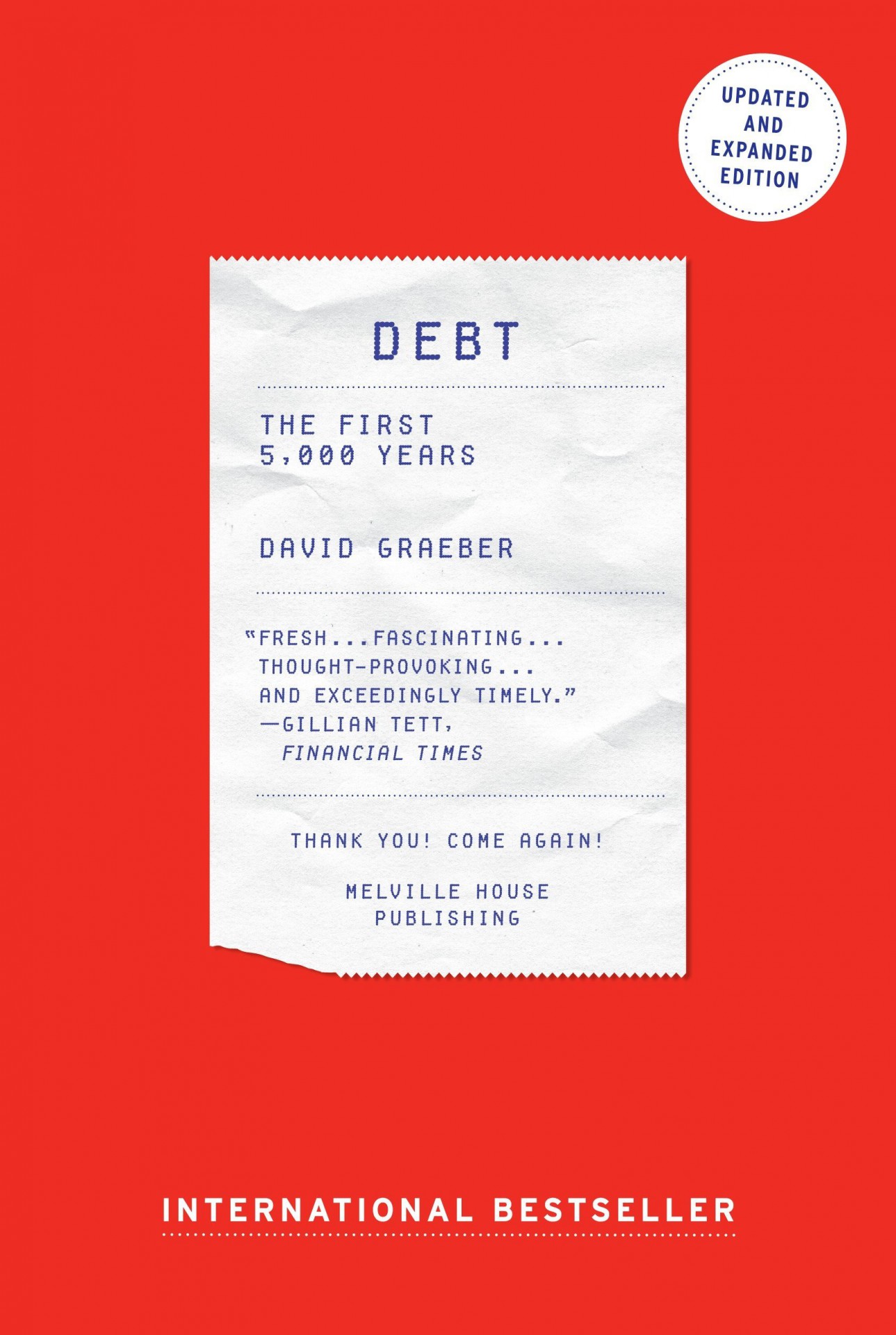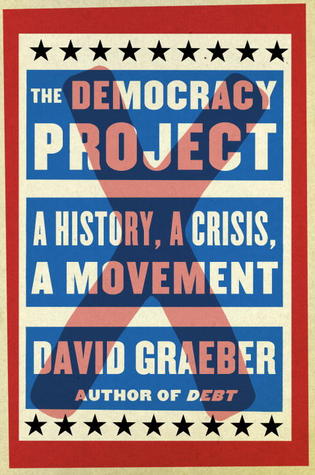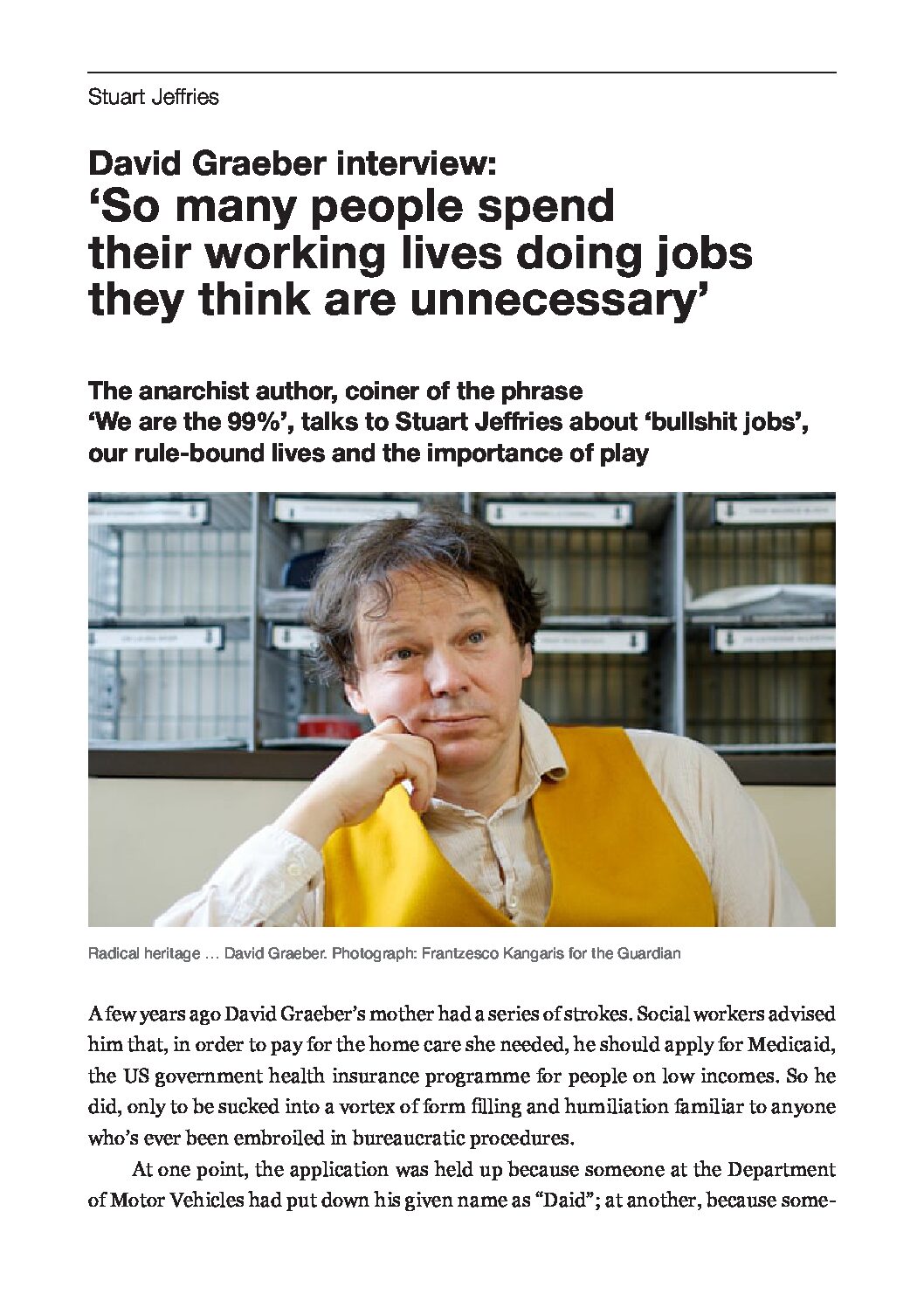
Stuart Jeffries (Guardian) interview about bureaucracy and unnecessary jobs
21 Mar 2015
So many people spend their working lives doing jobs they think are unnecessary
It has been commonplace to assume that bureaucracy means government. However, there are classic bureaucratic procedures everywhere. J.M.Keynes predicted that the future would bring 15-hour working weeks. This hasn’t happened. Meaningless positions have been created in the very capitalist system, which is claimed to be efficient. Still, an objective measure of meaningful social value doesn’t exist.
Predicted technological wonders have not happened. Instead, antidepression drugs are mushrooming as well as technologies imposing discipline and social control. David Graeber coined the slogan “We are the 99%” during the events of Zuccotti Park in 2011 and the Occupy Wall Street movement. It was about the idea that social services can be provided without endless bureaucracy.
His thought-provoking book “Debt: The First 5,000 Years” was praised by Thomas Piketty and Russell Brand. It called for a landslide wiping out of sovereign and consumer debt. “Utopia of Rules” highlights the distinction between play and game, where the former is a free-form creativity, and the latter is based on rules. Instead of being rule-following economic drones of capitalism, people are essentially playful.
David Graeber interview: ‘So many people spend their working lives doing jobs they think are unnecessary’
Afew years ago David Graeber’s mother had a series of strokes. Social workers advised him that, in order to pay for the home care she needed, he should apply for Medicaid, the US government health insurance programme for people on low incomes. So he did, only to be sucked into a vortex of form filling and humiliation familiar to anyone who’s ever been embroiled in bureaucratic procedures.
At one point, the application was held up because someone at the Department of Motor Vehicles had put down his given name as “Daid”; at another, because someone at Verizon had spelled his surname “Grueber”. Graeber made matters worse by printing his name on the line clearly marked “signature” on one of the forms. Steeped in Kafka, Catch-22 and David Foster Wallace’s The Pale King, Graeber was alive to all the hellish ironies of the situation but that didn’t make it any easier to bear. “We spend so much of our time filling in forms,” he says. “The average American waits six months of her life waiting for the lights to change. If so, how many years of our life do we spend doing paperwork?”
The matter became academic, because Graeber’s mother died before she got Medicaid. But the form-filling ordeal stayed with him. “Having spent much of my life leading a fairly bohemian existence, comparatively insulated from this sort of thing, I found myself asking: is this what ordinary life, for most people, is really like?” writes the 53-year-old professor of anthropology in his new book The Utopia of Rules: On Technology, Stupidity and the Secret Joys of Bureaucracy. “Running around feeling like an idiot all day? Being somehow put in a position where one actually does end up acting like an idiot?”
“I like to think I’m actually a smart person. Most people seem to agree with that,” Graeber says, in a restaurant near his London School of Economics office. “OK, I was emotionally distraught, but I was doing things that were really dumb. How did I not notice that the signature was on the wrong line? There’s something about being in that bureaucratic situation that encourages you to behave foolishly.”
But Graeber’s book doesn’t just present human idiocy in its bureaucratic form. Its main purpose is to free us from a rightwing misconception about bureaucracy. Ever since Ronald Reagan said: “The most terrifying words in the English language are: I’m from the government and I’m here to help”, it has been commonplace to assume that bureaucracy means government. Wrong, Graeber argues. “If you go to the Mac store and somebody says: ‘I’m sorry, it’s obvious that what needs to happen here is you need a new screen, but you’re still going to have to wait a week to speak to the expert’, you don’t say ‘Oh damn bureaucrats’, even though that’s what it is – classic bureaucratic procedure. We’ve been propagandised into believing that bureaucracy means civil servants. Capitalism isn’t supposed to create meaningless positions. The last thing a profit-seeking firm is going to do is shell out money to workers they don’t really need to employ. Still, somehow, it happens.”
Graeber’s argument is similar to one he made in a 2013 article called “On the Phenomenon of Bullshit Jobs”, in which he argued that, in 1930, economist John Maynard Keynes predicted that by the end of the century technology would have advanced sufficiently that in countries such as the UK and the US we’d be on 15-hour weeks. “In technological terms, we are quite capable of this. And yet it didn’t happen. Instead, technology has been marshalled, if anything, to figure out ways to make us all work more. Huge swaths of people, in Europe and North America in particular, spend their entire working lives performing tasks they believe to be unnecessary. The moral and spiritual damage that comes from this situation is profound. It is a scar across our collective soul. Yet virtually no one talks about it.”
Which jobs are bullshit? “A world without teachers or dock-workers would soon be in trouble. But it’s not entirely clear how humanity would suffer were all private equity CEOs, lobbyists, PR researchers, actuaries, telemarketers, bailiffs or legal consultants to similarly vanish.” He concedes that some might argue that his own work is meaningless. “There can be no objective measure of social value,” he says emolliently.
In The Utopia of Rules, Graeber goes further in his analysis of what went wrong. Technological advance was supposed to result in us teleporting to new planets, wasn’t it? He lists some of the other predicted technological wonders he’s disappointed don’t exist: flying cars, suspended animation, immortality drugs, androids, colonies on Mars. “Speaking as someone who was eight years old at the time of the Apollo moon landing, I have clear memories of calculating that I would be 39 years of age in the magic year 2000, and wondering what the world around me would be like. Did I honestly expect I would be living in a world of such wonders? Of course. Do I feel cheated now? Absolutely.”
But what happened between the Apollo moon landing and now? Graeber’s theory is that in the late 1960s and early 1970s there was mounting fear about a society of hippie proles with too much time on their hands. “The ruling class had a freak out about robots replacing all the workers. There was a general feeling that ‘My God, if it’s bad now with the hippies, imagine what it’ll be like if the entire working class becomes unemployed.’ You never know how conscious it was but decisions were made about research priorities.” Consider, he suggests, medicine and the life sciences since the late 1960s. “Cancer? No, that’s still here.” Instead, the most dramatic breakthroughs have been with drugs such as Ritalin, Zoloft and Prozac – all of which, Graeber writes, are “tailor-made, one might say, so that these new professional demands don’t drive us completely, dysfunctionally, crazy”.
His bullshit jobs argument could be taken as a counterblast to the hyper-capitalist dystopia argument wherein the robots take over and humans are busted down to an eternity of playing Minecraft. Summarising predictions in recent futurological literature, John Lanchester has written: “There’s capital, doing better than ever; the robots, doing all the work; and the great mass of humanity, doing not much but having fun playing with its gadgets.” Lanchester drew attention to a league table drawn up by two Oxford economists of 702 jobs that might be better done by robots: at number one (most safe) were recreational therapists; at 702 (least safe) were telemarketers. Anthropologists, Graeber might be pleased to know, came in at 39, so he needn’t start burnishing his resume just yet – he’s much safer than writers (123) and editors (140).
Graeber believes that since the 1970s there has been a shift from technologies based on realising alternative futures to investment technologies that favoured labour discipline and social control. Hence the internet. “The control is so ubiquitous that we don’t see it.” We don’t see, either, how the threat of violence underpins society, he claims. “The rarity with which the truncheons appear just helps to make violence harder to see,” he writes.
In 2011, at New York’s Zuccotti Park, he became involved in Occupy Wall Street, which he describes as an “experiment in a post-bureaucratic society”. He was responsible for the slogan “We are the 99%”. “We wanted to demonstrate we could do all the services that social service providers do without endless bureaucracy. In fact at one point at Zuccotti Park there was a giant plastic garbage bag that had $800,000 in it. People kept giving us money but we weren’t going to put it in the bank. You have all these rules and regulations. And Occupy Wall Street can’t have a bank account. I always say the principle of direct action is the defiant insistence on acting as if one is already free.”
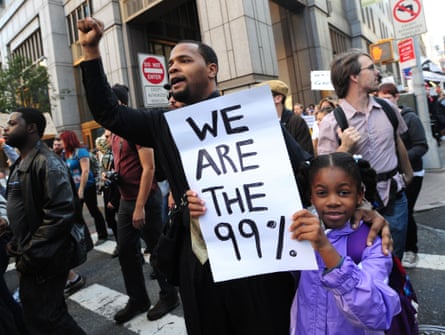
He quotes with approval the anarchist collective Crimethinc: “Putting yourself in new situations constantly is the only way to ensure that you make your decisions unencumbered by the nature of habit, law, custom or prejudice – and it’s up to you to create the situations.” Academia was, he muses, once a haven for oddballs – it was one of the reasons he went into it. “It was a place of refuge. Not any more. Now, if you can’t act a little like a professional executive, you can kiss goodbye to the idea of an academic career.”
Why is that so terrible? “It means we’re taking a very large percentage of the greatest creative talent in our society and telling them to go to hell … The eccentrics have been drummed out of all institutions.” Well, perhaps not all of them. “I am an offbeat person. I am one of those guys who wouldn’t be allowed in the academy these days.” Indeed, he claims to have been blackballed by the American academy and found refuge in Britain. In 2005, he went on a year’s sabbatical from Yale, “and did a lot of direct action and was in the media”. When he returned he was, he says, snubbed by colleagues and did not have his contract renewed. Why? Partly, he believes, because his countercultural activities were an embarrassment to Yale.
Born in 1961 to working-class Jewish parents in New York, Graeber had a radical heritage. His father, Kenneth, was a plate stripper who fought in the Spanish civil war, and his mother, Ruth, was a garment worker who played the lead role in Pins and Needles, a 1930s musical revue staged by the international Ladies’ Garment Workers’ Union.
Their son was calling himself an anarchist at the age of 16, but only got heavily involved in politics in 1999 when he became part of the protests against the World Trade Organisation meeting in Seattle. Later, while teaching at Yale, he joined the activists, artists and pranksters of the Direct Action Network in New York. Would he have got further at Yale if he hadn’t been an anarchist? “Maybe. I guess I had two strikes against me. One, I seemed to be enjoying my work too much. Plus I’m from the wrong class: I come from a working-class background.” The US’s loss is the UK’s gain: Graeber became a reader in anthropology at Goldsmiths, University of London, in 2008 and professor at the LSE two years ago.
His publications include Fragments of an Anarchist Anthropology (2004), in which he laid out his vision of how society might be organised on less alienating lines, and Direct Action: An Ethnography (2009), a study of the global justice movement. In 2013, he wrote his most popularly political book yet, The Democracy Project. “I wanted it to be called ‘As if We Were Already Free’,” he tells me. “And the publishers laughed at me – a subjunctive in the title!” But it was Debt: The First 5,000 Years, published in 2011, that made him famous and has drawn praise from the likes of Thomas Piketty and Russell Brand. Financial Times journalist and fellow anthropologist Gillian Tett argued that the book was “not just thought-provoking but exceedingly timely”, not least, no doubt, because in it Graeber called for a biblical-style “jubilee”, meaning a wiping out of sovereign and consumer debts.
At the end of The Utopia of Rules, Graeber distinguishes between play and games – the former involving free‑form creativity, the latter requiring participants to abide by rules. While there is pleasure in the latter (it is, to quote from the subtitle of the book, one of the secret joys of bureaucracy), it is the former that excites him as an antidote to our form‑filling red-taped society.
Just before he finishes his dinner, Graeber tells me about the new idea he’s toying with. “It’s about the play principle in nature. Usually, he argues, we project agency to nature insofar as there is some kind of economic interest. Hence, for instance, Richard Dawkins’s The Selfish Gene. I begin to understand the idea better– it’s an anarchist theory of organisation starting with insects and animals and proceeding to humans. He is suggesting that, instead of being rule-following economic drones of capitalism, we are essentially playful. The most basic level of being is play rather than economics, fun rather than rules, goofing around rather than filling in forms. Graeber himself certainly seems to be having more fun than seems proper for a respected professor.
The Utopia of Rules is published by Melville House

